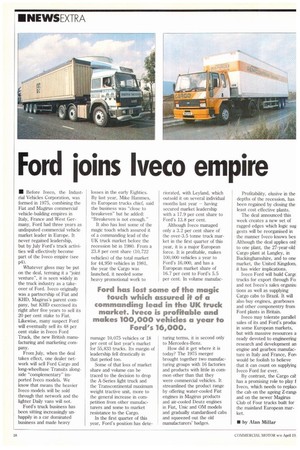Ford joins Imo empire
Page 18

If you've noticed an error in this article please click here to report it so we can fix it.
• Before Iveco, the Industrial Vehicles Corporation, was formed in 1975, combining the Fiat and Magirus commercial vehicle-building empires in Italy, France and West Germany, Ford had three years as undisputed commercial vehicle market leader in Europe. It never regained leadership, but by July Ford's truck activities will effectively become part of the Iveco empire (see P4).
Whatever gloss may be put on the deal, terming it a "joint venture", it is seen widely in the truck industry as a takeover of Ford. Iveco originally was a partnership of Fiat and KHD, Magirus's parent company, but KHD exercised its right after five years to sell its 20 per cent stake to Fiat. Likewise, many suspect Ford will eventually sell its 48 per cent stake in Iveco Ford Truck, the new British manufacturing and marketing company.
From July, when the deal takes effect, one dealer network will sell Ford Cargo and long-wheelbase Transits alongside "complementary" imported Iveco models. We know that means the heavier Iveco models will be sold through that network and the lighter Daily vans will not.
Ford's truck business has been sitting increasingly unhappily in a car dominated business and made heavy losses in the early Eighties. By last year, Mike Hammes, its European trucks chief, said the business was "close to breakeven" but he added: "Breakeven is not enough."
It also has lost some of the magic touch which assured it of a commanding lead of the UK truck market before the recession bit in 1980. From a 23.8 per cent share (10,722 vehicles) of the total market for 44,950 vehicles in 1981, the year the Cargo was launched, it needed some heavy promotional work to manage 10,075 vehicles or 18 per cent of last year's market for 55,833 trucks. Its margin of leadership fell drastically in that period too.
Some of that loss of market share and volume can be traced to the decision to drop the A-Series light truck and the Transcontinental maximum weight tractive unit, more to the general increase in competition from other manufacturers and some to market resistance to the Cargo.
In the first quarter of this year, Ford's position has dete
riorated, with Leyland, which outsold it on several individual months last year — having secured market leadership with a 17.9 per cent share to Ford's 13.8 per cent.
Although Iveco managed only a 3.2 per cent share of the over-3.5 tonne truck market in the first quarter of this year, it is a major European force. It is profitable, makes 100,000 vehicles a year to Ford's 16,000, and has a European market share of 16.7 per cent to Ford's 5.5 per cent. In volume manufac turing terms, it is second only to Mercedes-Benz.
Ilow did it get where it is today? The 1975 merger brought together two manufacturing groups with 16 factories and products with little in common other than that they were commercial vehicles. It streamlined the product range by offering water-cooled Fiat engines in Magirus products and air-cooled Deutz engines in Fiat, Unic and OM models and gradually standardised cabs and squeezed out the old manufacturers' badges. Profitability, elusive in the depths of the recession, has been regained by closing the least cost effective plants.
The deal announced this week creates a new set of ragged edges which logic sug gests will be reorganised in the manner Iveco knows bes Although the deal applies onl; to one plant, the 27-year-old Cargo plant at Langley, in Buckinghamshire, and to one market, the United Kingdom, it has wider implications.
Iveco Ford will build Carg trucks for export through Fa and not Iveco's sales org-anisi tions as well as supplying Cargo cabs to Brazil. It will also buy engines, gearboxes and other componentry from Ford plants in Britain.
Iveco may tolerate parallel sales of its and Ford's produt in some European markets, but with massive resources a ready devoted to engineering research and development an engine and gearbox manufacture in Italy and France, For+ would be foolish to believe that it can count on supplying Iveco Ford for ever.
By contrast, the Cargo cat has a promising role to play f Iveco, which needs to replaci the cab on the ageing Z-rangi and on the newer Magirus Club of Four trucks built for the mainland European market.
• by Man Millar






























































